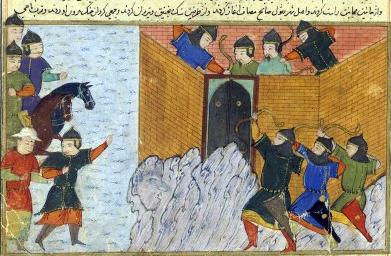Greg had a great post the other day on the controversy surrounding the Washington football team’s long-standing “nickname” — Redskins. I’ve spent more time than is healthy reading internet comment sections on this issue, so I consider myself an expert on the arguments against changing the name. Most are as vacuous as they are willfully ignorant.
“But what about the Fighting Irish? Or the Vikings? Or the Celtics? We would have to change them too.”
This one is my favorite. As if there’s no difference between mascots named for the predominant ethnic group in the area and a racial nickname for the sports team in a capital that once carried out an active policy of ethnic cleansing against that racial group. As someone with Norwegian, Irish, and Native American ancestry, I am particularly amused by these comparisons. No Minnesotans of Swedish origin are up in arms about being compared to their Viking ancestors. Sure, they did a fair share of pillaging, but Vikings had democratic assemblies and were among the most advanced seafaring civilizations of their era. Boston Celtics? The history of the basketball team cannot be told without contextualizing it within Boston’s identity as an Irish city (for better and for worse). Fighting Irish is a similar situation. It was coined by a member of Notre Dame’s own football team and embraced by the Irish Catholic student body, unless there’s a massive uprising against it we’re not hearing about.
“But Indians support the name!”
Then they’ll point to some ten year old poll and talk about how there are Redskin team names on Native American reservation. Oh, ok. No problem then. I guess the fact that some Natives don’t care negates those that do. I’m pretty sure that’s how it works. Just like if your black friend lets you say slurs, you’re free to yell them around other black people and then name your business a racial slur. No problems there.
“Uhhg it’s the LIBERALS trying to PC everything up.”
Ah, the old P.C. canard. I prefer to think of this issue less as enforcing “politically correct” terminology and more making sure none of our sport teams are named something blatantly racist. When the Redskins were founded by vile racist George Preston Marshall, the term Oriental was in vogue to refer to Asian people. Does that mean we should name a team the Orientals? What about the Coloreds? That word and a few others were pretty popular around that time to refer to black people. Dan Snyder, owner of the Redskins, is a Jewish person. I wonder if he would appreciate a team named the Hebes (or worse) with a hooknosed Jew clasping a bag of gold. I know for sure the Washington Darkeys wouldn’t fly today, but this is essentially what we are talking about: an antique word, a relic from an era where pasty scientists obsessively studied the differences between the “races” and learned men established white dominion over the language.
“Don’t be weak and choose to be offended.”
This is perhaps the stupidest. First of all, you don’t really choose to take offense. But second of all, I don’t think Natives are “offended,” so much as sick of the bullshit. I know a decent amount of Natives, most of whom grew up on/close to a reservation. I once asked a friend of mine about the name Redskins and he replied, “It’s not that it’s offensive — it’s just really dumb.” He went on to describe numerous different ways a team could honor Native Americans without going right to skin color. This guy has also paler skin than I do, but grew up in Oklahoma in a Native family. Just demonstrates the name is inaccurate in addition to stupid.
“It’s not racist! The Redskins are named after their Indian former coach”
This ones complicated and involves draft dodging. The Redskins were founded in Boston and originally shared a field with the Boston Braves baseball team. When they moved to Fenway Park, home of the Red Sox, the name was changed to Redskins. Marshall was quoted at the time saying the name change was to avoid confusion with the other Native-referencing team, NOT because a coach was Native. It is also not at all clear the coach Marshall referenced, Willie “Lone Star” Deitz, was actually a Native American. Deitz was put on trial and briefly imprisoned for draft dodging WWI by claiming he was a Native American. The jury could not conclude he knowingly lied about his heritage, but a number of discrepancies in the Deitz family’s testimony, as well as his interactions with his supposed sister and her Sioux tribesmen, suggest otherwise. So not only is this origin story not true, the supposed Indian coach likely wasn’t a Native.
“There are bigger issues we should be concerned about”
The history of the United States is a road paved with Native American bones. Since coming to this continent, Europeans have cleansed Natives from their lands, reneged on treaties, massacred Native women and children, conducted biological warfare against them. Many Native Americans live today in extreme poverty, while rape and sexual violence are epidemics on reservations. These are obviously much more pressing issues than a stupid team name. But the name Redskins remains a window into an epoch (one not yet entirely over) where racism was blissfully casual and the Washington football marching band wore headdresses and played “Dixie” before the anthem. Perhaps it is a fitting name for Washington D.C.’s team after all.






 The New York Times has
The New York Times has 